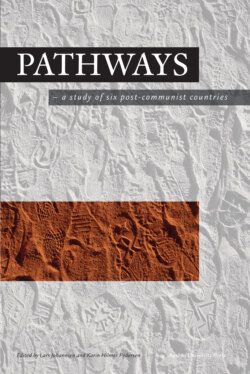Читать книгу Pathways - Группа авторов - Страница 10
На сайте Литреса книга снята с продажи.
Dismantling or rebuilding the state
ОглавлениеAlthough not in the frontline, transformation of the state – or state building – is closely related to political and economic transition. State building was somewhat overlooked in democratisation discussions (Linz & Stepan 1996), which initially confined themselves to the study of institutions and how postcommunist countries revised and/or adopted new constitutions and electoral systems (Lijphart 1994; Geddes 1996; Pogany 1996; Frye 1997; Johannsen 2000). However, its connectedness to economic reform became evident only two years after the regimes broke down, when Offe (1991) posited that the Central and Eastern European countries faced a ‘triple transition’. In addition to democratisation and marketisation, Offe argued that stateness, a conflation of state and nation building, was also an essential aspect of transition. But as made clear by Grzymala-Busse and Luong (2002), many scholars overlooked the need to reconstruct public authority in the post-communist countries, instead seeing the agenda as state dismantling in the face of the behemoth communist state.
Later contributions have emphasised other dimensions of state building, partly because the dust from the constitutional struggles has settled, partly because marketisation and privatisation created a demand-driven agenda (Fukuyama 2004). This agenda clearly goes beyond a concept of state building focusing on monopolising physical violence within a given recognised territory, even though this has indeed been particularly problematic in Georgia. Rather, the state-building agenda points to increasing governance capacity and ability to fulfil core obligations. Most importantly, the new economic order required as much attention as the rebuilding of the state’s capacity to guarantee and protect the rights and liberties crucial to the enforcement of contracts and the protection of citizens’ property. The rebuilding of the state’s capacity to govern emphasises both elite decision-making and implementation capacity. On the one hand, decision-making capacity illuminates the importance of democratic bargaining and compromise within the elite and its responsiveness to public interests. This decision-making capacity emphasises the elite’s ability to rebuild state functions, not only within the core obligations mentioned above, but increasingly in terms of securing the public infrastructure and service facilities necessary to ensure economic performance. On the other hand, insufficient state capacity impedes the implementation of decisions made by elected officials (see, for example, Pedersen & Johannsen 2004). Consequently, consolidated democracy becomes largely irrelevant if the laws passed by a democratically elected parliament are poorly implemented, and hence do not have the intended impact on citizens’ lives. Thus, however important the establishment and acceptance of democratic procedures by state and non-state actors alike, the functionality of a democratic government is nullified if the state does not have the capacity needed to implement these decisions.
This debate emphasises that democracy requires not only Montesquieu’s division of power, but also functioning and capable administrations guided by Weberian and democratic principles (Peters 1995; Linz & Stepan 1996; Bunce 2000). This emphasis comprises three aspects. First, the challenge of state building was coping with a public administration legacy from the communist regime based on ‘command-and-control’ principles and subordinated to the political interests of the regime (Verheijen, 1999; Obolonsky, 1999). Although this system did in many ways resemble a Weberian ideal type bureaucracy, it became the very antithesis of efficiency and transparency because of the highly politicised communist culture.
Second, the emphasis on state building has highlighted the issue of corruption. Corruption is not just a moral problem – it also circumvents democratic decision-making processes within the legislature and has an adverse impact on adoption and implementation (Pedersen & Johannsen 2006a; Johannsen & Pedersen 2007). While corruption may certainly be problematic in moral terms, some scholars argue that systematised corruption can result in a state administration that at least functions (Miller et al. 2001), which to some extent was the case in Georgia (Christophe 2004). Although the new EU-member states in particular have had increasing success in gaining control of corruption, it is still a considerable problem in these countries, and even more so in states that are not EU members (Johannsen & Pedersen, 2008). Third, the specific topic of lustration, elimination of people regarded as renegades during the communist regime by the new elite, elevated political criteria above experience and efficiency (Kaldor & Vejvoda 1997). On the other hand, while lustration policies were harsh in the Czech Republic, Poland only began to discuss the issue more than ten years after the Soviet regime broke down. Moreover, in the Czech Republic lustration is continuously criticised for being unjust, based on rumours and gossip, and for striking at random.
The issue of state building has thus become fused with an emerging literature on state capacity and administrative reform (Cummings & Nørgaard 2004; Goetz 2001). The central aspect of state building has been applied to administrative and judicial reform, civil service legislation, economically sustainable salaries and education, all focusing on a Weberian-inspired meritocracy in order to avoid arbitrary administrative decisions and informal empowerment of the elite (Nunberg 2000).
